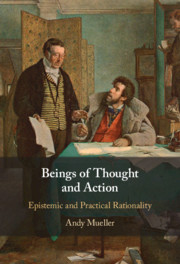Book contents
- Beings of Thought and Action
- Beings of Thought and Action
- Copyright page
- Contents
- Figures
- Tables
- Acknowledgments
- Prologue
- Part I Beings of Thought in Action
- Chapter 1 Epistemic Encroachment on Practical Rationality
- Chapter 2 Practical Reasoning, Ends, and the End of Hope
- Chapter 3 Contexts, Costs, and Benefits
- Chapter 4 Knowledge and Seemingly Risky Actions
- Part II Beings of Action in Thought
- Glossary
- References
- Index
Chapter 2 - Practical Reasoning, Ends, and the End of Hope
from Part I - Beings of Thought in Action
Published online by Cambridge University Press: 25 June 2021
- Beings of Thought and Action
- Beings of Thought and Action
- Copyright page
- Contents
- Figures
- Tables
- Acknowledgments
- Prologue
- Part I Beings of Thought in Action
- Chapter 1 Epistemic Encroachment on Practical Rationality
- Chapter 2 Practical Reasoning, Ends, and the End of Hope
- Chapter 3 Contexts, Costs, and Benefits
- Chapter 4 Knowledge and Seemingly Risky Actions
- Part II Beings of Action in Thought
- Glossary
- References
- Index
Summary
Epistemic norms for practical reasoning usually concern the question which epistemic condition must be met for it to be rationally permissible to treat p as a reason for action. I call this the classical question. In this chapter, I broaden the debate about epistemic norms, going beyond the classical question by focusing on ends. In section 2.1, I argue that we can approach the question of which ends one can rationally pursue by answering the question what one may hope for. In section 2.2, I argue that the standard condition on rational hope is too weak to properly constrain what one can rationally hope for. In section 2.3, I give my own account of what one may epistemically hope for, to which knowledge is central. In section 2.4, I point out that this suggests a novel angle on the knowledge-first program. In section 2.5, I relate my account of hope back to pursuing ends. Finally, in section 2.6, I argue that the wide variety of ends one can rationally pursue shows that many of the suggested epistemic norms that concern the classical question are overly demanding.
- Type
- Chapter
- Information
- Beings of Thought and ActionEpistemic and Practical Rationality, pp. 31 - 54Publisher: Cambridge University PressPrint publication year: 2021



